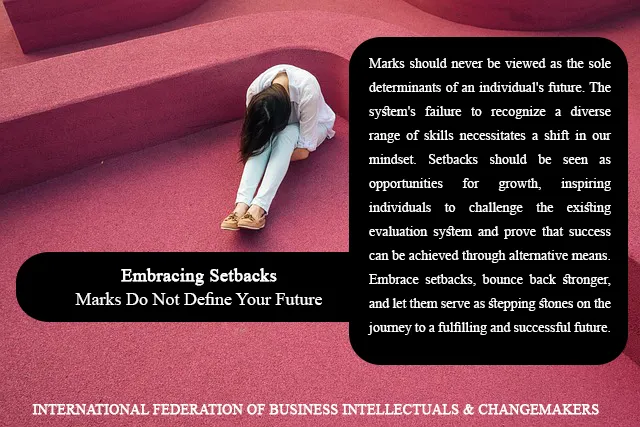Embracing Setbacks: Marks Do Not Define Your Future
Introduction: In a society that often places undue emphasis on academic achievements, it is essential to remember that one's worth and potential extend far beyond mere exam scores. The notion that marks are the sole determinants of success is a flawed system that fails to recognize individual talents and unique skills. This article aims to shed light on the fallacy of relying solely on grades as a measure of future prospects and encourages individuals to bounce back from setbacks, proving that failure is not a definitive end but rather a catalyst for growth and resilience.

Marks as an Inadequate Measure of Skill: The current system of evaluating skills based on marks is fundamentally flawed. It fails to account for the diverse range of abilities that individuals possess. While grades may provide some indication of academic performance, they do not capture important qualities such as creativity, critical thinking, problem-solving, leadership, or emotional intelligence. These skills, often developed through real-world experiences, are invaluable in navigating the complexities of professional and personal life.
The Danger of Demoralization: Receiving poor grades can be disheartening, leading to feelings of self-doubt and discouragement. However, it is crucial to remember that setbacks do not define an individual's capabilities or limit their potential. Allowing a single disappointment to overshadow one's ambitions and dreams would be a disservice to oneself. Instead, setbacks should serve as powerful motivators, igniting the determination to prove that the system needs revision and that success can be achieved through alternative avenues.
Inspiration through Setbacks: Many successful individuals have experienced setbacks early in their lives, only to rise above and achieve great things. History is replete with examples of renowned personalities who overcame initial failures to become trailblazers in their respective fields. These setbacks acted as the impetus for their determination, inspiring them to work harder, persevere, and ultimately achieve their goals. Aspire to follow in their footsteps, drawing strength from setbacks and using them as stepping stones towards future success.
Preparing for the Future: Setbacks should be viewed as valuable learning experiences that equip individuals with valuable insights and resilience. Rather than dwelling on past disappointments, focus on the next steps of the journey. Identify areas for improvement, set new goals, and explore alternative paths that align with personal passions and aspirations. Dedicate time to acquiring practical skills, engaging in real-world experiences, and building a strong support network. Remember that a single exam does not define your future; it is your dedication, perseverance, and adaptability that shape the path ahead.
Conclusion: Marks should never be viewed as the sole determinants of an individual's future. The system's failure to recognize a diverse range of skills necessitates a shift in our mindset. Setbacks should be seen as opportunities for growth, inspiring individuals to challenge the existing evaluation system and prove that success can be achieved through alternative means. Embrace setbacks, bounce back stronger, and let them serve as stepping stones on the journey to a fulfilling and successful future.
